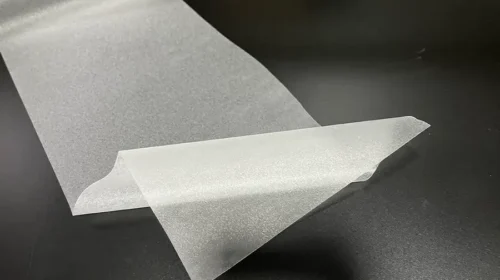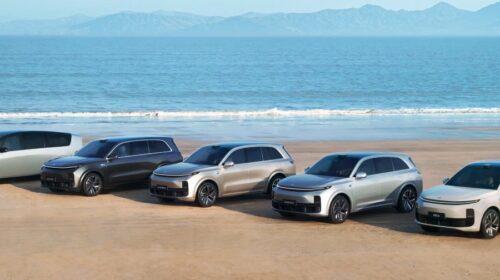IM Motors steers clear of EV shockwaves with funding deal

The SAIC Group’s electric vehicle unit has secured its financial base despite disappointing car sales and jitters over the abrupt collapse of a rival firm
Key Takeaways:
- IM Motors raised 9.4 billion yuan in a Series B financing in 2024
- The maker of high-end electric cars plans to launch EVs with extended ranges in the coming year to increase its market share
By Lee Shih Ta
Late last year, a tech giant’s dream of cruising into the electric car market came to a shuddering halt, leaving the crowded sector bracing for a pile-up.
The sudden collapse of Baidu-backed Jiyue Auto, crushed under fierce competition and financing woes, put China’s electric vehicle industry on notice for a potentially messy shakeout.
But investors in another ambitious electric car maker seem to have held their nerve into the New Year, stumping up 9.4 billion yuan ($1.28 billion) in fresh financing for Zhiji Automotive Technology Co. Ltd, a premium manufacturer operating under the brand IM Motors.
As part of the SAIC Motor (600104.SH) group, IM Motors is spearheading the auto giant’s push into the electric vehicle market, announcing in late December it had successfully concluded a Series B financing round to fund its onward journey, in spite of the clouds hanging over the industry.
The cash infusion gives IM Motors a bigger war chest for the intensifying battle over new energy vehicles (NEVs).
With 10 billion yuan from the angel round and 3 billion yuan from the Series A financing, IM Motors has raised 22.4 billion yuan since its launch in 2020. The latest funds will be used to develop core technologies such as computer-regulated steering, electronic chassis controls and smart driving, as well as helping to accelerate the launch of new models, IM Motors said.
Up to now, IM Motors has been one of the names on the danger watchlist as China’s NEV industry enters a winnowing-out phase after explosive growth.
But the company has gained some traction in the past few months while other players, such as HiPhi, WM Motor and Jiyue all crashed out of the race in 2024. IM Motors announced in December it had passed the milestone of 100,000 deliveries since it was founded, while sales also exceeded 10,000 units for two straight months through November in a sign of upward momentum.
Accumulated output of 100,000 units is regarded as a make-or-break point that can determine whether an NEV manufacturer will survive and prosper or head for the scrap heap of automotive history.
Big backers
IM Motors has some powerful allies in its corner, from tech and motor giants to component makers.
Aside from SAIC, its financial backers include ZhangJiang Hi-Tech (600895.SH) and Alibaba (9988.HK; BABA.US). SAIC owns or controls about 46.5% of the shares, while Alibaba commands about 13.1%. Some of the company’s suppliers are also shareholders, with a vested interest in their partner’s survival and success. Battery suppliers CATL (300750.SZ) and Qingtao Energy each hold a stake of 0.49% in IM Motors, while smart driving systems maker Momenta has a 0.24% shareholding.
IM Motors has so far launched four models, but its vehicle sales are still hovering around 10,000 units per month, far less than the orders for leading electric car brands and leaving the company short of its own annual target.
CEO Liu Tao had set a goal of 120,000 to 130,000 unit sales in 2024, working out to around 10,000 units or more per month. However, the company sold only 57,000 units in the first 11 months of last year, double the previous year’s tally but less than half of the annual target. IM Motors is still travelling in the slow lane of China’s NEV makers, ranking outside the top 10 manufacturers.
The sticking point for consumers could be the premium pricing, as IM Motors positioned itself from the start as a high-end brand, with its first two models, the L7 and LS7, retailing for more than 400,000 yuan.
In November, the two premium models together sold fewer than 200 units while the more affordable L6 and LS6, priced below 210,000 yuan, topped the company’s sales charts. The LS6 alone sold 5,509 units, proving more popular than a cheaper alternative made by China’s Nio Inc. (NIO.US; 9868.HK), the ONVO L60. Judging from these patterns, IM Motors could boost sales by introducing more cost-effective models. The company has outlined plans to launch four new vehicles in 2025 to boost its market share, two of them hybrids with extended driving ranges.
Meanwhile, SAIC struck a deal with Audi in May to jointly develop EV models. The Chinese financial news provider Caixin has reported that IM Motors will be responsible for the new designs, indicating confidence in the Chinese firm’s technical capability that could translate into a better performance.
SAIC CEO at the wheel
SAIC, China’s biggest auto company by market share, is counting on IM Motors to recharge its sales figures as demand wanes for conventional vehicles.
SAIC’s revenue fell 17.4% in the first three quarters of 2024 from the same period a year earlier, while profit tanked by nearly 40%. The bottom line would have looked even worse if SAIC had not sold a stake in MG India for 5.13 billion yuan in 2024. The main driver of the decline has been the weakening market for cars powered by fossil fuels, typically provided by joint ventures such as SAIC’s long-standing partnership with Volkswagen. Many auto companies, including SAIC, have been forced to decide whether to risk joining the EV stampede as profit from their mainstay business dwindles.
The importance of IM Motors as a growth engine was underlined by executive changes last year that strengthened the parent company’s strategic oversight of the electric car maker. SAIC Motor chief Jia Jianxu took over two boardroom positions at IM Motors in early December, including the role of chairman.
In July, Jia had become the SAIC group’s youngest leader at the age of 46. In an internal speech in October, he acknowledged changes in the automotive market, saying self-developed brands were the way forward as the money-making potential of the joint-venture model starts to run out of road.
Compared with the ill-fated Jiyue Auto, which lost the confidence of its backers and investors, IM Motors has funds in place and the support of its parent company as it gears up for further combat on the NEV battleground.
To subscribe to Bamboo Works free weekly newsletter, click here






